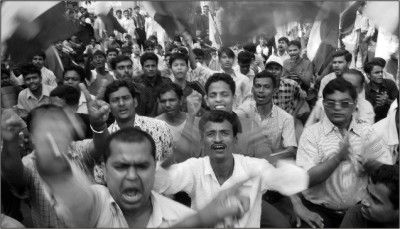
A generation united and untied
Imran Asif
 Born in the late 70s, I have an outlook of Ekushey which is rather different from that of those who had the opportunity to witness the Language Movement in 1952. I have grown up and watched 30 Februaries so far, in each of which Ekushey was observed with a profound sense of respect. Fifty five years since 1952, and Ekushey still fosters the sense of unity, and the strength thereof, more than ever before.
Born in the late 70s, I have an outlook of Ekushey which is rather different from that of those who had the opportunity to witness the Language Movement in 1952. I have grown up and watched 30 Februaries so far, in each of which Ekushey was observed with a profound sense of respect. Fifty five years since 1952, and Ekushey still fosters the sense of unity, and the strength thereof, more than ever before.
Our brave predecessors fought for the language we speak today. The language in which we call our mothers 'Maa". The language in which the rebel poet Nazrul wrote 'Bidrohi'. And it is truly disheartening to see how often we end up disrespecting the language many heroes like Rafiq, Salam, Jabbar and Barkat had fought and died for fearlessly.
When I took my son to get admitted to an English-medium school in my neighbourhood, I was told that he would be required to utter as many words in English as possible, especially when responding to little questions pitched at him. Waiting for his turn to be called in, I watched other parents giving their little gems last minute lessons. One mother was asking her son in English, "What is your name?" and the kid answered, "I am fine". I fail to understand why English-medium schools would force three year old toddlers to speak in a language they do not understand already. Why do the schools rather not make the effort to 'teach' them English at the school instead? Why do not the schools emphasize that the kids can understand and speak in proper Bengali, so they can learn English as a second language in a far more comprehensive manner?
Coming back to Ekushey, I honestly think it should be more than just walking barefoot to the Shaheed Minar in the early hours of the day and place floral wreaths to pay homage to the heroes. Our politicians unmistakably make a circus of it every year. The race goes on - who brought bigger floral wreaths, and who got to show more of their faces on television. The pretence of respect becomes so bare that it offends the sense of shame of any dignified person watching the show.
Ekushey, as I see it, teaches us to unite and fight for what is meant to be our very own. This passion of Ekushey combined with the endless energy of youth can empower us to change our lives for the better. We can chase off the evil that our politicians so often are, who plundered the country's wealth to build their own. We can earn our rights to justice, so that the deserving ones are put behind bars and the innocent are freed to be with their wailing families.
As we observe International Language Day on 21st February, the spirit of Ekushey should give a shot in the arm to our self-belief, so that we can unite and untie ourselves and fight for the future that twinkles in our eyes.
Imran Asif in engaged in the aviation industry.